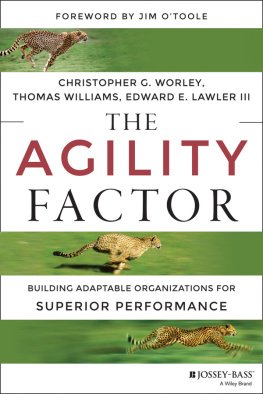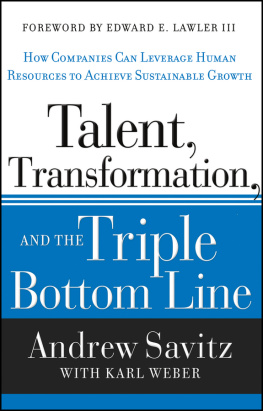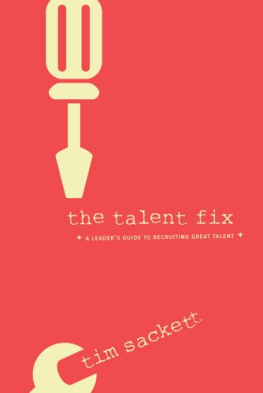REINVENTING TALENT MANAGEMENT
OTHER BOOKS BY EDWARD E. LAWLER III
Built to Change
Management Reset
Treat People Right
Talent
REINVENTING TALENT MANAGEMENT
PRINCIPLES AND PRACTICES FOR THE NEW WORLD OF WORK
EDWARD E. LAWLER III


Reinventing Talent Management
Copyright 2017 by Edward E. Lawler III
All rights reserved. No part of this publication may be reproduced, distributed, or transmitted in any form or by any means, including photocopying, recording, or other electronic or mechanical methods, without the prior written permission of the publisher, except in the case of brief quotations embodied in critical reviews and certain other noncommercial uses permitted by copyright law. For permission requests, write to the publisher, addressed Attention: Permissions Coordinator, at the address below.

Berrett-Koehler Publishers, Inc.
1333 Broadway, Suite 1000
Oakland, CA 94612-1921
Tel: (510) 817-2277, Fax: (510) 817-2278
www.bkconnection.com
Ordering information for print editions
Quantity sales. Special discounts are available on quantity purchases by corporations, associations, and others. For details, contact the Special Sales Department at the Berrett-Koehler address above.
Individual sales. Berrett-Koehler publications are available through most bookstores. They can also be ordered directly from Berrett-Koehler: Tel: (800) 929-2929; Fax: (802) 864-7626; www.bkconnection.com
Orders for college textbook/course adoption use. Please contact Berrett-Koehler: Tel: (800) 929-2929; Fax: (802) 864-7626.
Orders by U.S. trade bookstores and wholesalers. Please contact Ingram Publisher Services, Tel: (800) 509-4887; Fax: (800) 838-1149; E-mail: customer.Ordering for details about electronic ordering.
Berrett-Koehler and the BK logo are registered trademarks of Berrett-Koehler Publishers, Inc.
First Edition
Hardcover print edition ISBN 978-1-5230-8250-6
PDF e-book ISBN 978-1-5230-8251-3
IDPF e-book ISBN 978-1-5230-8252-0
2017-1
Set in Minion Pro by Westchester Publishing Services.
Cover design by Kirk DouPonce, DogEared Design
Interior design by Jamie Tipton, Open Heart Designs
For Patty
My love
My reason for being
TABLE OF CONTENTS
CHAPTER 1
The Changing World of Work, Workers, and Organizations
CHAPTER 2
Strategic Talent Management
CHAPTER 3
Attracting Talent
CHAPTER 4
Selecting Talent
CHAPTER 5
Developing Talent
CHAPTER 6
Rewarding Talent
CHAPTER 7
Performance Management
CHAPTER 8
Organizing for Talent Management
CHAPTER 9
Talent Management Reinvented
PREFACE
The people who work for organizations are usually referred to as their employees or workers or maybe their human resources. Despite this, I prefer to use the word talent to refer to them. Why? Because I think it is a term that better captures who they are and how they should be managed. They are very valuable, often the most valuable assets of organizations. Because of what they can do, they determine how effective their organizations are. Increasingly, they are highly skilled and need to be managed in ways that utilize and develop their skills.
An organizations talent is not just employees who are expected to do a job. Talent comprises individuals who differ in what they can do and can learn, and what they want to do. To be effective, organizations need to manage talent in ways that makes it a major contributor to their success. Doing this requires talent management systems and practices that are not common practice or best practice in todays organizations.
Most organizations still use a job-based bureaucratic talent management approach that does not fit todays world of work and workers and will not fit tomorrows. It is not enough to modify the old approach; a reinvention is needed. There is a considerable amount of research that shows what practices and programs will be effective in the new world of work and workers. It is thus possible to identify and specify the direction in which talent management practices should head and to describe in detail those that are being used by some organizations today.
This book identifies the major direction in which talent management needs to go and identifies specific programs and practices that will take it there. Consideration is given to the design and management of the key activities of an organizations talent management systems: attracting, selecting, developing, rewarding, and appraising. The book provides principles and practices that will reinvent talent management so that it will be aligned with an organizations strategy and become a key source of competitive advantage. It concludes with how organizations should be designed and led to effectively manage their talent management systems.
The audience for this book is anyone who is interested in the development and implementation of talent management strategies, principles, and practices that are effective in the new world of work, workers, and organizations. This includes executives and line managers in all functions who hire, develop, and supervise talent as well as human resource professionals in all types and sizes of organizations. Thought leaders at consulting firms and universities who are drivers of talent management principles and practices are an important audience, as are students of human resources, since they are the future of talent management.
1
THE CHANGING WORLD OF WORK, WORKERS, AND ORGANIZATIONS
Work, workers, and organizations are changing in significant ways, and at an ever increasing rate, and there is every reason to believe that both the degree and the rate of change will continue to increase. Most of these changes have significant and profound implications for how talent should be managed.
Simply stated, many of the old principles and practices concerning what makes for good talent management are obsolete as a result of the changing nature of work, workers, and organizations. What used to be good or best practiceor at least good enough practicewith respect to how people are recruited, selected, trained, developed, rewarded, and evaluated simply does not fit todays workforce and workplaces. These strategies, practices, and policies have become increasingly obsolete, and virtually every activity that organizations engage in with respect to how human capital is managed needs to be changed to become a best practice in this new world of work. This includes many of todays best reward, selection, and development practices.
So far the talent management principles and practices of most organizations have not changed significantly in response to this new world of work. They still follow a job-based bureaucratic model, focusing on job descriptions, equating fairness with sameness and seniority, and are managed by human resources (HR) functions that are not changing as fast as the world of work is. This has resulted in numerous books and articles that are critical of HR, some of which suggest blowing it up.
Table 1.1 Percentage of current time spent on various HR roles in the United States
Next page








